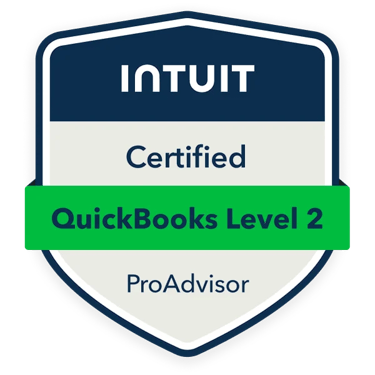Christopher Wilson
When Does Your Small Business Need a CPA?
Learn when a small business should hire a CPA vs a bookkeeper. Easily identify CPA "call-now" triggers, distinguish what falls under routine bookkeeping, and discover a simple, cost-effective way to leverage both without overspending.
FEATURED GUIDES
9/7/20255 min read
A Quick Overview
The question “Do I need a CPA?” often arises when a business outgrows basic recordkeeping. While bookkeeping provides reliable financial management—through accurate categorization, reconciliations, and detailed monthly reports—it’s only part of the equation. A CPA becomes essential when financial decisions carry tax, legal, or funding implications. Whether it’s selecting the right business entity, managing multi-state sales tax, planning depreciation, addressing IRS notices, or preparing financial statements for lenders, a CPA offers specialized expertise. Knowing when to transition from bookkeeping alone to incorporating CPA support can help you avoid costly mistakes and maximize tax benefits at the right time.
CPA vs Bookkeeper: Who Does What?
A bookkeeper is the heartbeat of your financial operations. They meticulously record transactions, reconcile accounts, manage receivables and payables, and provide accurate Profit & Loss, Balance Sheet, and Cash Flow statements every month. Well-maintained books bring clarity, allowing you to spot trends, control expenses, and make informed operational decisions with confidence and speed.
A CPA builds upon that foundation by providing critical guidance and ensuring compliance in high-stakes situations:
Tax Strategy & Preparation: Optimize entity elections (e.g., S-Corp), navigate complex sales tax requirements, maximize credits and deductions, and strategically manage depreciation timing.
Assurance & Representation: Prepare lender-ready financial compilations and reviews, and expert representation before tax authorities.
Structural Guidance: Explore strategies for owner compensation, retirement planning, equity or stock options, and adjustments to accounting methods.
The bookkeeper supplies the data, while the CPA leverages it to optimize results and ensure compliance. Together, they form a seamless partnership to support your financial success.
When to Hire a CPA
There’s no revenue milestone that necessitates involving a CPA, but there are definite signs to watch for:
Increasing Tax Complexity: As your business evolves—whether through changing entities, investing in major equipment, or expanding across multiple states—tax management becomes increasingly complex. A skilled CPA can help by optimizing elections and depreciation strategies to reduce your tax burden over time.
Stakeholder Requirements: Whether it’s banks, landlords, grant providers, or investors, stakeholders often require CPA-prepared financial statements, such as compilations or reviews.
Regulatory Moments: IRS or state notices, sales tax nexus complexities, and accounting method changes all call for expert guidance and strategic planning.
Strategic Inflection Points: Periods of rapid growth, mergers and acquisitions, equity compensation, or succession planning are critical moments where tax-efficient decision-making can drive significant benefits.
When a Bookkeeper Is Sufficient
For many early-stage or simple businesses, small business bookkeeping can effectively serve as the core financial function. If your operations are limited to one state, your payroll is straightforward, and you’re not actively seeking funding, maintaining a disciplined monthly close can address 80–90% of your financial requirements. At this stage, your focus should be on:
Accurate categorization matched to a clear chart of accounts.
On-time reconciliations for every bank and credit card.
Consistent monthly reports that you actually review and use.
This simplifies tax season and helps lower your CPA bill by eliminating the need to sort through disorganized data.
Bookkeeping lays the groundwork, while CPA advisory provides the strategic edge. With well-maintained books, a CPA can work more efficiently, delivering greater insights and superior results.
Key Insight

How Bookkeepers and CPAs Work Together
The most efficient and cost-effective approach is a seamless handoff. Your bookkeeper provides reconciled, well-organized financial records, while your CPA transforms them into strategic planning and compliance. A straightforward, consistent workflow ensures everything runs smoothly:
Monthly: Bookkeeping finalizes financial records, detects discrepancies, and prepares audit-ready documentation.
At Key Milestones or Quarterly: A CPA offers strategic expertise on critical planning topics such as entity structuring, compensation strategies, tax credits, and sales tax nexus requirements. They also manage filings and ensure all necessary documentation is prepared to satisfy stakeholder obligations.
This approach ensures CPAs can dedicate their time to strategic and compliance initiatives, maximizing their impact where it matters most.
A Quick Self-Assessment
If you answer “Yes” to any of the following questions, it may be time to consult a CPA in addition to your regular bookkeeping.
Are you:
Exploring entity changes or evaluating the benefits of an S-Corp election.
Selling nationwide or managing remote teams across multiple states.
Seeking financing, engaging with investors, or managing due diligence processes.
Purchasing or selling major equipment or a business, or planning substantial write-offs or tax credits.
Dealing with tax notices or managing sales tax complexities.
Introducing stock compensation, implementing owner distributions, or establishing new retirement plans.
A single “Yes” doesn’t mean you need a full-time CPA, but it does mean that strategic CPA advice can save you time, money, and unnecessary stress.
While not every situation requires a CPA, there are critical moments when their expertise is invaluable—managing complex tax filings, navigating regulatory challenges, ensuring stakeholder confidence, or making high-impact decisions. For everything else, dependable small business bookkeeping is key. Maintaining accurate, actionable financial records ensures you're ready to tackle the issues that matter most.
In Summary
Ready to Trade Bookkeeping Stress for Strategy?
Cilson Bookkeeping delivers personalized bookkeeping, accounting, and business advisory services, all at straightforward flat-rate monthly pricing. Whether you need help with day-to-day bookkeeping or specialized industry-specific solutions, Cilson provides comprehensive support tailored to your unique needs, empowering your business to grow and succeed.
No pressure, no credit card, just a 15 to 30-minute chat.
Frequently asked questions
When Should You Hire a CPA?
Consider hiring a CPA when your financial situation becomes more complex or the stakes are higher. Key scenarios include changing your business structure (such as electing S-Corp), purchasing significant equipment, addressing tax notices, or navigating the buying or selling of a business. A CPA can provide expert guidance to help you manage these critical moments with confidence.
When should I use a bookkeeper instead of a CPA?
A bookkeeper is your best choice for managing routine, ongoing financial tasks. If your primary needs are accurate expense categorization, timely reconciliations, and clear monthly financial reports, a bookkeeper offers an efficient and cost-effective solution. They’ll also ensure your records are “tax-ready,” making it easier when the time comes to involve a CPA.
How can you use both effectively without overspending?
Follow a simple strategy: rely on your bookkeeper monthly and bring in your CPA at critical moments. Your bookkeeper ensures your financial records are accurate and up to date, while your CPA provides expert review and strategic advice a few times a year or during major transitions. By maintaining clean, well-organized books, you’ll reduce the hours (and costs) spent with your CPA while maximizing the value of their expertise. This “bookkeeper-first, CPA-when-needed” approach gives you consistent, reliable financial data and expert guidance exactly when it matters without paying premium rates for routine tasks.
What’s the difference between a bookkeeper and a CPA?
A bookkeeper manages your daily financial tasks, including recording transactions, reconciling bank and credit card accounts, issuing invoices, paying bills, and generating monthly reports. On the other hand, a CPA handles more strategic and complex tasks such as tax planning and filing, advising on the best business structure, preparing financial statements for lenders, and addressing IRS matters.
Explore Bookkeeping Services
Discover the comprehensive services offered by Cilson Bookkeeping, tailored to meet the unique needs of professionals across various industries. From lawyers and realtors to consultants, architects, contractors, and other service providers, Cilson Bookkeeping delivers customized solutions designed to simplify your financial management.
EXPERTLY LED
Hi, I’m Christopher Wilson: Your one-on-one partner in profits, time, and peace of mind. I turned 20+ years of finance, audit, and hands-on ownership into one promise. I’ll treat your books with the same care I once gave billion-dollar balance sheets. Only now my focus is on you.
FAST FACTS & CREDENTIALS
Certified QuickBooks ProAdvisor bookkeeper. I keep up so you don’t have to.
BBA in Finance, Investment and Banking, University of Wisconsin–Madison.
I'm a two-time small business owner: retail wine shop and now Cilson Bookkeeping.
I serve clients nationwide from my home base in Littleton, CO: 100% remote, 100% personal.
About Cilson Bookkeeping


READY TO WORK TOGETHER?
I’d love to learn about your business goals and show you the simplest path to get there!
© 2026 Cilson Ventures, LLC d/b/a Cilson Bookkeeping. Original text, design, and graphics are copyright protected. Portions of this page include AI-assisted content that may be in the public domain.
Intuit, QuickBooks, and QuickBooks ProAdvisor are registered trademarks of Intuit Inc. used with permission under the QuickBooks ProAdvisor Agreement.
Get in touch
Address
Littleton CO 80125
Serving Denver & Colorado’s Front Range
Contacts
(720) 257-9065
CILSON BOOKKEEPING
